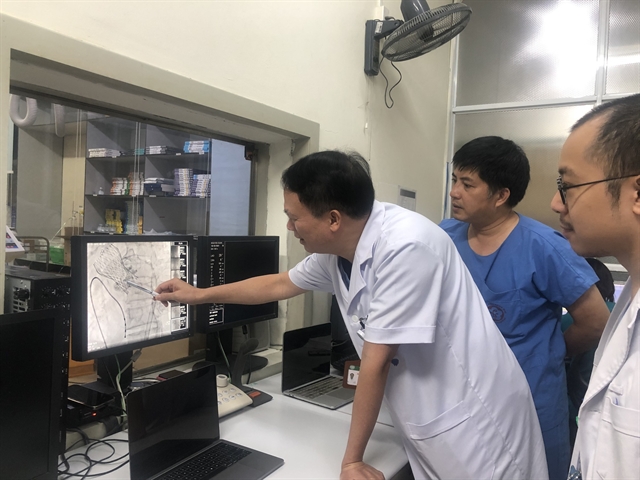 Society
Society


|
| Associate professor Phạm Mạnh Hùng (centre), director of the Việt Nam National Heart Institute, regular discusses with other experts during the surgery. — Photo courtesy of the institute |
HÀ NỘI — Doctors from the Việt Nam National Heart Institute (VNHI) have successfully conducted a valve-in-valve replacement surgery for an 82-year-old male patient.
This is the first surgery of its kind in Việt Nam, and the success of the operation further affirmed Vietnamese doctors’ mastery of many advanced techniques in the cardiovascular sector, said the VNHI.
The patient T. received a transcatheter aortic valve replacement at the VNHI 10 years ago. He was among the first patients receiving this surgery at the VNHI at that time.
Recalling that time, doctors said that T. was hospitalised in very serious condition with severe heart failure and pneumonia, so he had to be intubated.
Examination showed that he had severe aortic valve stenosis. He could be at special high risk of danger if a surgery were performed.
Doctors still decided to conduct surgery and it was successful.
He then recovered well. For many years, he had regular check-ups and had a happy life with his family.
But during the past year, he often had to go to the hospital because of severe heart failure.
Ultrasound showed that the biological valve had severely degenerated, had significant valve regurgitation, and dilated heart chambers.
After discussing, the doctors decided that replacing his valve was mandatory, and as his health condition did not allow for open heart surgery, the optimal choice for the valve replacement was through a valve-in-valve catheter.
Cardiologists, anaesthesiologists, critical care physicians, echo-cardiographers and surgeons agreed on the plan and performed the procedure.
T. underwent the 30-minute surgery on Wednesday.
Now he is in stable condition. Hemodynamic indicators are significantly improved.
At present, degenerative aortic valve disease is increasingly common as life expectancy rises and cardiovascular risks accumulate.
In developed countries, it is estimated that about one to three per cent of over-75-year-old people have aortic valve disease at serious levels. Treatment for it previously required open heart surgery.
However, in cases of severe condition and old age, the risk is very high and in many cases surgery is not possible.
Transcatheter aortic valve replacement has become the superior choice which offers many advantages for elderly patients with aortic valve stenosis, as it does not require open heart surgery and is usually followed by quick recovery. — VNS




